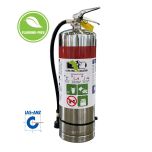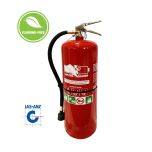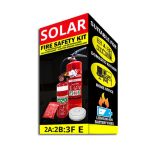Are you prepared for a Lithium Ion Battery Fire ?
A Lithium Ion Battery fire can happen (electric car batteries, smartphones, laptops , gardening tools, solar panel batteries, remote control cars & toys...) and it’s important to always be prepared for what you would do if you had one in your home or electric car.
Lithium-ion batteries are safe but extremely sensitive to high temperatures and inherently flammable. These battery packs tend to degrade much faster than they normally would, due to heat. If a lithium-ion battery pack fails, it will burst into flames and can cause widespread damage.
Home Lithium Ion battery fires usually start when a rechargeable battery is left charging overnight (especially electrical equipment from overseas which use low-quality components). Avoid overcharging lithium-ion batteries by removing them from the charger as soon as they are recharged.
With more and more people using equipment powered by these Lithium Ion batteries, the risk of home Lithium-ion batteries fire increases everyday. Lithium-ion batteries are typically charged in areas such as garages, sheds and patios that do not have smoke alarms fitted which result in a fire going undetected for some time meaning the fire tends to do more damage.
Home fires started by lithium-ion batteries statistics in Australia
It is difficult to locate statistics about fire-related incidents in Australian states and territories, and even more challenging to find statistics that can be compared in a meaningful way.
The Department of Fire and Emergency Services are warning an increase in the use of lithium-ion batteries expected over the next few years could result in a surge of preventable blazes.
The following table provide a limited snapshot of Lithium Ion fire-related incidents in Western Australia (sourced on https://www.dfes.wa.gov.au/):
| 2018/2019 | 2019/2020 | 2020/2021 | |
| Structure Fire | 1289 | 1336 | 1244 |
| Home Lithium Ion Battery Fires | 7 | 11 | 16 |
| Percentage | 0.54% | 0.82% | 1.28% |
We can clearly see an increasing trend of Lithium Ion Battery related fires.
Lithium-ion batteries Fire Safety Video
Of course, having the right safety equipment to protect your assets against lithium fire, such as a F-500 (Lithium Ion Battery Fire) Extinguisher and having an escape plan is essential to protect your family and your home or car.
Here is a a very informative video about Lithium Ion Batteries fire safety which explained what fire equipment you need and how to use them:
Why lithium-ion batteries catch fire?
While lithium-ion cells have been designed with battery safety measures (Pressure-sensitive vent holes, Separator serves as a fuse, Positive Temperature Coefficient) , it can still overheat and catch fire. Here are some reasons why:
- Manufacturing Defects
- Design Flaws
- Abnormal or Improper Usage
- Charger Issues
- Low-quality components
Chargers and batteries must be correctly matched electrically and comply with Australian standards, so it is vital to only use the charging equipment supplied with the device or purchased from a reputable retailer.
All battery chargers are required to undergo rigorous testing to meet Australian standards so be cautious about purchasing any electrical equipment from overseas.
What to do If a Lithium Ion fire occurs?
If you notice the lithium-ion battery overheat, try moving the device away from flammable materials and cutting of the current supply. If you’re in an electric vehicle, you should immediately evacuate and never attempt to extinguish lithium battery fires yourself.
if the lithium fire is small and you are equipped with a F-500 (Lithium Ion Battery Fire) Extinguisher you can try extinguishing the fire.
MAKE SURE YOU HAVE DISCONNECTED THE BATTERY FROM ITS CHARGER / POWER POINT. Or cut the power to your home. F-500s are water based and can conduct electricity.
- Get everybody out of the home or car.
- Call the fire service on 000.
- Do a headcount and let the fire service know if someone is missing.
- Do not go back inside.
- Remember Call triple zero (000).
What fire safety equipment should I have?
Important fire and overall safety products for your home include:
- Lithium Ion Fire Extinguishers
- ABE Fire Extinguishers (not effective on Lithium fire)
- smoke alarms - in all locations with Lithium Ion Batteries
- fire blankets (not effective on Lithium fire)
- carbon monoxide alarms



